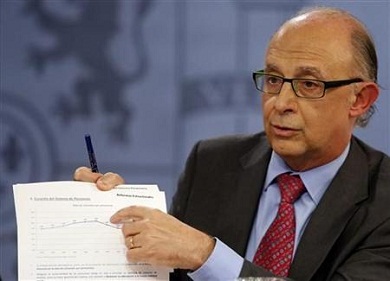
Searching for an explanation of the current Spanish state deficit, which has since 2007 risen rapidly and in excess affecting all public administrations, we’ll find that there isn’t a huge increase in spending but a dramatic drop in income. Public debt, now added to a high private indebtedness, has rendered the country financially unsustainable.
During the years previous to the crisis, politicians in office fell for the illusion that income forecasts–which work as an estimate and never marks a legal limitation–were consistently lower than revenue collection. When real spending surpassed what had been budgeted, nothing happened. Legal complications were then sorted out via accounting engineering or, worse, hiding some bills in the drawer.
Net revenue collection was so large it used to compensate for expansionary budget changes. In 2005, 2006 and 2007, the state recorded 108.9 percent, 109.5 percent and 107.4 percent respectively over budget forecasts. In direct tax income, the state collected 108.9 percent, 110.3 percent and 114.5 percent respectively over expectations.
Regional governments were in the same situation, although with less intensity and better appreciation of the new reality. In 2005, 2006, net revenue collection was 102.1 percent and 103.6 percent over forecasts, but it fell in 2007 to 98.5 percent.
Indirect tax collection had decreased for regions as much as for the central government, but Madrid could compensate it with a superior revenue collection of direct taxes. The Spanish central administration remained for longer under the illusion that holes in budget spending would be somehow fixed at some point.
Net revenue collection, though, was sending a very different message: 78 percent 2008, and 67.3 percent in 2009.
While the central administration kept up appearances, regions’ budgets became more realistic: in 2008, the deviation was of 10 percentage points, a third of the gap recorded in Madrid. In 2009, regional spending fell 2 percentage points but central administration spending grew a 10-percentage point difference against lower revenue collection.
Regions have improved their financial behaviour to a higher extent than the central administration. Nevertheless, budgets had everywhere ended turned into propaganda tools instead of a reflection of the real economy. It is time that regions and the central administration stop talking about their good intentions and take acting responsibly.





Be the first to comment on "Spain and the ever higher tax revenue bait"